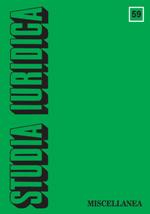Dziennikarski obowiązek zachowania szczególnej staranności i rzetelności przy zbieraniu i wykorzystaniu materiałów prasowych
A Journalist’s Obligation to Observe Due Diligence and Reliability while Collecting and Using Press Materials
Author(s): Lech JaworskiSubject(s): Law, Constitution, Jurisprudence
Published by: Wydawnictwa Uniwersytetu Warszawskiego
Keywords: prawo; nauki prawne; teoria i praktyka prawa; law; legal science; theory and pratcical law
Summary/Abstract: A journalist while conducting his/her job has certain rights and prerogatives in the process of mass communication. They are, however, connected with certain obligations and responsibilities. The press must present events factually and a journalist’s work must meet specific standards. One of them is the obligation to observe due diligence and reliability while collecting and using press materials, especially checking the truthfulness of information obtained or naming its source. The notion of a journalist’s diligence has not been defined in the press law. Therefore, attempting to define it on the grounds of the press law, it is necessary to resort to other laws, works of literature as well as the case law, which is abundant in this matter. The difference between the requirement of due diligence from journalists and expectations from other professions comes from the fact that more is expected from journalists than just professionalism and following professional procedures. It is important not to be just professionally skillful, looking for sensation, tracking wrongdoings, but also to be able to see all sides of the story and to write in a truthful and reliable way. Due diligence is a special skill, therefore the work of a journalist should be also particularly, extraordinarily diligent. Apart from the requirement of due diligence, the legislators expect reliability from journalists. It has to be noted that the term ‘diligence’ refers mainly to the intellectual parameters of quantity, while ‘reliability’ refers to the intellectual parameters of quality of the written work. Both requirements, however, are mutually complimentary and both form a holistic aspect of fulfilling a journalist’s obligation while collecting and using materials. The issues connected with protecting personal rights of informants and other persons are not the subject of this publication; however, it is not possible to ignore them completely, as they are closely connected with the regulation described in the paper, affecting the assessment of a journalist’s behaviour in the context of breaching those rights, in the light of both civil as well as criminal law.
Journal: Studia Iuridica
- Issue Year: 2014
- Issue No: 59
- Page Range: 149-168
- Page Count: 20
- Language: Polish

